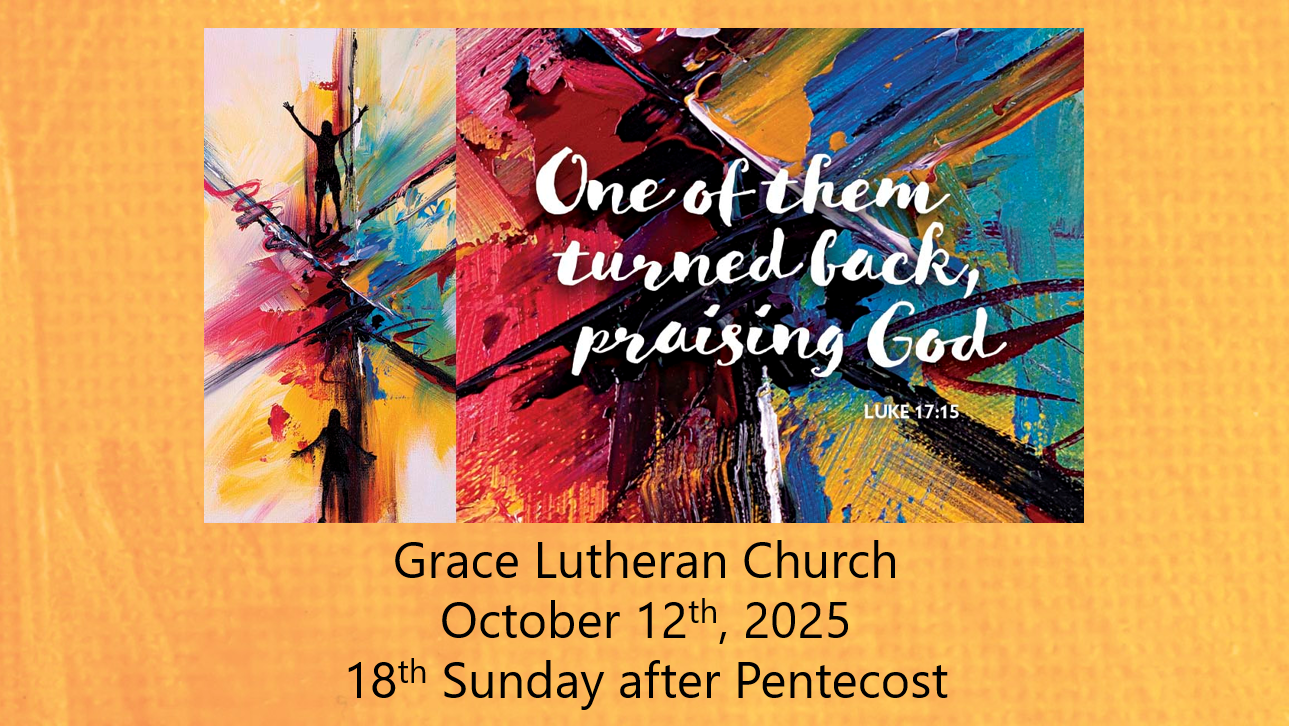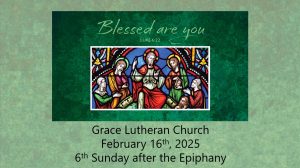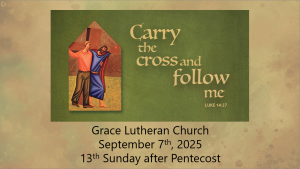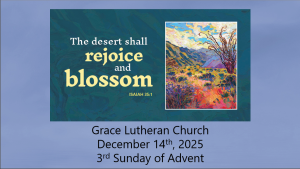Hi everyone,
Welcome to worship for this 18th Sunday after Pentecost, which lands on Thanksgiving Sunday, October 12, 2025!
The bulletin for this service can be found here. In it, you will find the order and words of worship as well as the full sermon manuscript. You can use it to follow along with the service, or just with the words that will appear on your screen.
For a fuller online worship experience, you are invited to have a lit candle in your space for most of the service, and extinguish it near the end after the sending hymn. And you are also welcome to participate in communion if you are comfortable, by having something small to eat and drink prepared for the appropriate time. Further instruction will be given then.
May the joy of God’s blessing and love fill you for service and community, this day and always!
Holy God, by the power of your Spirit may we know your love for us. By the truth of your Word may we be set free of all that binds us. By the grace of your welcome may we be lifted up as your people, in in the name of Christ. Amen.
There is this modern parable that is making its rounds on social media over the past couple of months. I call it a “modern parable” because I can’t seem to find the source for it other than social media, and also even Google called it that. So to you who created this story because chances are you’re still alive and maybe even watching this: thanks.
Anyway, the parable is about this monk who asks his students, “If you’re carrying a cup of coffee and someone bumps into you, why did you spill your coffee?” And all the students reply that they spilled the coffee because someone bumped into them. And then the monk says, “no, you spilled coffee because that’s what you were holding in your cup. If you had water in your cup, then you would have spilled water.” And the monk explains, whenever you get bumped in life, and you will get bumped in life, whatever you’re carrying is what will spill out. So if you’re holding onto fear, jealousy, anger, greed, then that’s what’s going to spill out. But if you’re carrying love, compassion, kindness, empathy, then that’s what’s going to spill out. So every morning you should pause and think to yourself, “what am I carrying in my cup today?”
Profound, huh? While we can poke holes in the logic of it and make excuses for ourselves and maybe others, the truth of the matter is that we are all carrying something or a bunch of different somethings in our cups. And while we might not always know what they are, they will rise to the surface when the going gets tough and spill out onto world, onto others, and onto our nice new clothes. Isn’t that aways the case? Sheesh.
But I don’t share this parable to shame anyone, but to invite you all into reflection of ourselves and why what keeps spilling out keeps spilling out. Whether it be anger, frustration, or a touch of road rage, I know that sometimes we can’t help but to carry what we carry. Sometimes we don’t have the means or ability to let go of the things we don’t want to carry anymore. Sometimes what we carry isn’t a choice, but a burden. But maybe the first step in healing is to know what we need to heal from. And according to the GI Joe cartoons I watched as a kid, knowing is half the battle.
And so all this made me think about Naaman in our first reading for today, and how he’s spilling out all over the place. His emotions and reactions are telling of what he’s holding in his cup. It doesn’t even seem like he was bumped or anything, rather he was invited to be healed. And instead of being grateful for the offer, he goes and tears his clothes. You know how much anguish you have to be in and how insulted you have to feel to tear your own clothes?
But of course, the “bump” that made Naaman spill all his pretentious self righteousness out onto his people came when he, this mighty warrior and great man with high favour falls with a skin disease. Like, we don’t know what kind of skin disease, it could have been measles or chicken pox or eczema or something, but I’m pretty sure it’s not leprosy as we understand it, as he wasn’t quarantined or anything. But still the disease was bad enough that it put a real chip on his shoulder. Or real foul emotions in his cup, as it were.
Because in the face of grace, Naaman reacted with suspicion. When shown promise, he was skeptical and didn’t want to believe. When offered healing, he scoffed and pretty much said he can take care of himself.
Yeah, that guy was carrying a lot in his cup.
And I’m not sure I can blame him. Life is difficult, and we are often thrown these curveballs that really put us in a bind. We don’t always find the support and healing that we need and we might be left stranded and alone with only our wits to save us. So we sometimes could have that bitterness in our cups and in our hearts, just as Naaman had in his.
And I’m sure the lepers in our gospel lesson would have as well. They were treated the way lepers were required to be treated according to the law of the time, and so they likely felt that pain of being dealt a bad hand, that hurt of being outcast and isolated from your community, and that loneliness of being unwelcomed. Although they didn’t react in the same way that Naaman did and we don’t know exactly what they were carrying in their hearts, we could imagine that they weren’t exactly the epitome of joy and happiness that we all strive to be.
We know the story. Jesus wanders by, they call out for help, and Jesus tells them to show themselves to the priests. And while they’re on their way, they’re healed and their skin cleared. But just one of them comes back to thank Jesus. The Samaritan one, no less.
And often we hear this story, we’re told that we should be like the Samaritan leper in having proper manners and say “thank you” when we’re given something. But I think it’s more than that. I mean, the text is clear that he was a Samaritan, and I don’t think I need to remind anyone of how much the Samaritans were hated on and racially profiled by the Jews as the absolute worst type of people, but I will anyways. I just did.
So as much as the other 9 lepers probably had that bitterness and “woe is me” attitude held tightly in their cups, this guy had more reason to do so. He had more ammo for his “me against the world” gun. He had more instances and life lessons that taught him how he just isn’t good enough, loveable enough, or welcome enough to ever be more than just an outcasted leper. He had all the more reason, but he still came back and gave thanks.
And I think this is where the lesson is, and not just the “be more thankful especially on Thanksgiving Sunday” kind of thing. But Jesus’ words to this healed leper is where the truth lies, “your faith has made you well” or “clean” or “whole”, depending on your translation. But in the Greek it’s “healed you.”
His faith healed him? I thought it was Jesus. I mean the others who walked away were healed too, but they didn’t show the same levels of faith. So what I think Jesus meant wasn’t so much about the leprosy has left them, but rather, his faith has healed him from what the world told him he is. His faith has cured him from the curse of bitterness and skepticism. His faith has taken his cup, emptied out the burdens, the loneliness, the sheer unworthiness that he was made to believe about himself, and filled it with gratitude, love, and a sense of purpose as a child of God.
This doesn’t mean that there won’t be bad things that will happen in our lives, they for sure will continue to happen. This doesn’t mean that we can’t feel angry at the state of the world or at others who have harmed us, I’m sure that will happen as well. This doesn’t even mean that we can and should turn a blind eye to the ways evil has run rampant. But what it does mean is that even in those bad times, we can dispel the bitterness from filling our cups. Even when times are rough and difficult, we can see God with us, holding us, and strengthening us to endure. Even when life is so impossible and we just can’t anymore, we can trust and believe that our faith will heal us.
Today is Thanksgiving Sunday. It’s a day that reminds us a lot about our country and who we are as residents of it. And as you could imagine, this day isn’t a celebration for all people. For some, this day is a reminder of a horrific past. And with all of these mixed emotions surrounding this day, we might wonder how we should feel. But I think above all, no matter what side of that line you land on, we can look to God and be reminded that no matter what the world tells us, we are loved. No matter how we might feel excluded, we belong. And no matter how we are treated by others, we needn’t carry the burden of bitterness but can be liberated by God’s grace to have our cups filled with joy, peace, and blessing.
So in this season after Pentecost, may we see how God continues hold and bless us in ways that we cannot imagine, and fill our cups with good things, that when we face the difficulties of life, we may continue to spill out God’s love and grace into the world. Thanks be to God. Amen.




